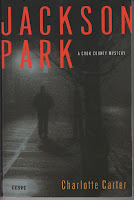In Days
of the Dead, the 7th novel in Barbara Hambly’s Benjamin
January series, the amateur detective and his wife ventured into Mexico to rescue
their friend and Benjamin’s fellow musician Hannibal Sefton. Since that trip,
Benjamin has solved crimes and dodged danger back in his hometown of New
Orleans. However, in June 1837, he loses the remainder of the money he had in
the Bank of Louisiana when it closes. Since many wealthy citizens of New
Orleans also lost money due to the bank failure, Benjamin can no longer find
work giving piano lessons to their children or playing the piano for the many
balls and operas. Rose’s school also has to close. The loss of income forces
him to venture again away from the familiar but perilous streets of New
Orleans.
In The
Shirt on His Back, the tenth novel in the series, the adventurous
amateur detective takes a job helping his friend Lieutenant Abishag Shaw of the
New Orleans Guards find the man who killed Shaw’s younger brother Johnny. Into
the Oregon Territory go Benjamin, Shaw, and their friend Hannibal. Benjamin carries
a notebook to record his observations of the Indians and the flora and fauna
for his scientific-minded wife Rose, who can’t accompany him as usual because
she is pregnant with their first child.
When the trio
reaches Fort Ivy, Shaw’s older brother Tom, the headman, tells him that Johnny
was found scalped, but he doesn’t think Indians killed him. He suspects Frank
Boden, the former clerk, killed Johnny because he saw the partially contents of
a letter containing the name “Hepplewhite” on Boden’s desk. The letter appeared
to suggest that Boden wasn’t who he claimed to be and might be up to something
nefarious. Tom tells them Boden left a few days ago and might be hiding among
the trappers at the rendezvous. The three men set out for the rendezvous where
the trappers gather each year to sell their beaver furs to the American Fur
Company or the Hudson Bay Company.
The plot involves
more than the hunt for Johnny’s killer. Benjamin eventually finds himself
having to solve the murder of an old man from Germany and the poisoning of
several trappers. When the three man hunters along with Johnny’s killer and his
Indian accomplices are captured by Blackfeet, Benjamin has to use his detective
skills to prevent the Chief from ordering their deaths by exposing the killer
of the old man and the trappers and convincing the chief that he and Shaw must
take the killer or killers back to face white man’s justice.
On the frontier,
except for one man who shows his prejudice against black folks, Benjamin is
treated as an equal once he proves he can shoot and fight and bravely face danger
from hostile Indians, bears, and the weather as well as any mountain man.
The narrative
voice in The Shirt On His Back, as in Hambly’s other novels in the
series, is Benjamin January’s, but the story belongs to Lieutenant Abishag Shaw,
a Kentucky mountain man who left the family feuds in his home state and settled
in New Orleans. He is one of the most interesting characters in the series and
Benjamin’s friend. This lanky Kentucky mountain man is almost as tall as
Benjamin, wears dirty clothes, has scraggly hair, and chews tobacco. Since he
became a lawman, he rejects the blood feuds of his home state. Thus, wrestling
with his conscious, he has to decide whether to kill Johnny’s murderer or bring
him in for trial.
As authors in other
novels have done, Hambly romanticized the mountain men. Also, she sees the Indians as victims, though she does
try to make them more complex—some are villains who are enticed into villainy
by white men and a desire for vengeance, and are some good guys. Using
Benjamin’s perspective, Hambly does a bit of preaching on a familiar subject, the
people responsible for the disappearance of the wilderness:
…the Americans came . . . Americans wanting beaver skins to
sell for hats so they could make money. Americans wanting slaves brought in
from Africa so they could grow cotton to sell to make money. Americans wanting
land that the Sioux and Shoshone and Cherokee had since time immemorial lived
on as hunters and as farmers . . . not so that they could farm themselves, but
so they could sell it to other whites for farms, so that they—the sellers—could
make money.
If you like tales about the American frontier, you’ll enjoy The Shirt On His Back, a detective-adventure
story of detection, murder, and narrow escapes frontier style.




